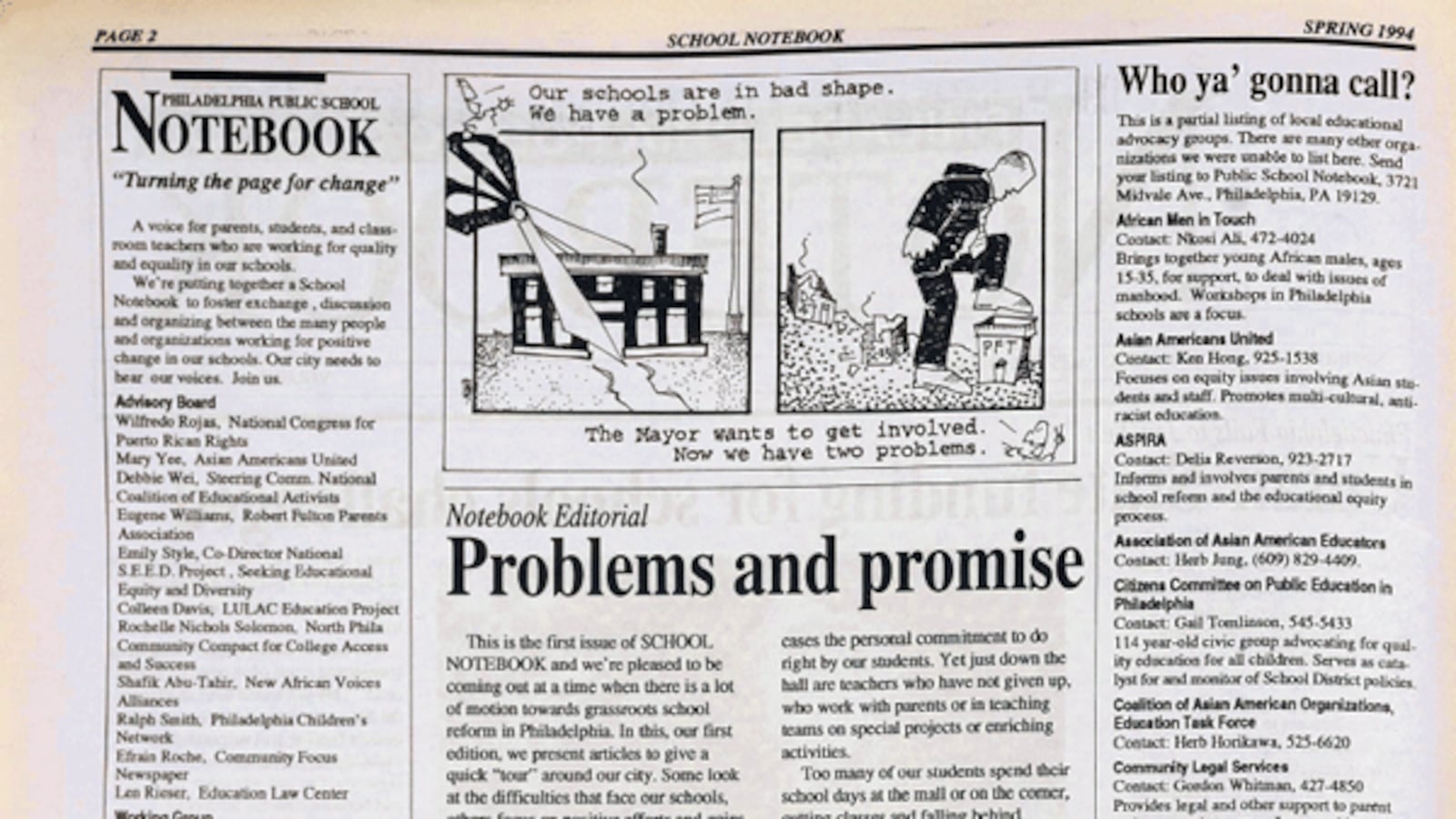This article was originally published in The Notebook. In August 2020, The Notebook became Chalkbeat Philadelphia.
The Notebook was launched in 1994 as a newspaper committed to ensuring quality and equity in Philadelphia public schools. We are celebrating the 20th anniversary of the first publication this spring. Over the next 20 weeks, we will feature an article from our archives each week shedding light on both the dramatic changes that have taken place in public education and the persistent issues facing Philadelphia’s school system.
The first edition of the Notebook, an all-volunteer effort, included the following statement from its founding editors.
From the Spring 1994 print edition:
Problems and promise
This is the first issue of School Notebook and we’re pleased to be coming out at a time when there is a lot of motion towards grassroots school reform in Philadelphia. In this, our first edition, we present articles to give a quick "tour" around our city. Some look at the difficulties that face our schools, others focus on positive efforts and gains we have won. In short, the problems and the promise.
In a Commonwealth courtroom, Judge Doris Smith has detailed the inequality and neglect suffered by an entire generation of neighborhood school children. But now concerned teachers and parents are raising their voices and mobilizing to enforce the Smith ruling and help design and implement a meaningful school-improvement plan.
In the chambers of City Hall, public officials have gathered to debate yet another budget for the school system that threatens to shortchange our students and impose another round of cuts upon each and every school. On the ground, active parents, school volunteers, and committed teachers scheme and scrape together what resources they can, putting their energy to develop solutions in the face of shortages.
In the offices down at 21st and the Parkway, the District administrators huddle, seeking to pick a new superintendent. But at public meetings, parents have pressed candidates, demanding to know their commitment to reform, equal treatment, and parental inclusion.
Too many school principals operate with their door shut to input from parents or teachers — some not seeking it, some seemingly unable to find it. Now, many schools are trying to construct governance councils, to share decisions among members of the school as an initial, if imperfect, step.
Whole sections of our town are full of school buildings literally falling apart from neglect, with classrooms stuffed to overflowing with students. But there are places such as Clemente, Lowell, and Central East where parents have fought for, and won new buildings, expanded class space and proper maintenance.
In classroom after classroom across the city, students deal with teachers who lack the equipment, support or in some cases the personal commitment to do right by our students. Yet just down the hall are teachers who have not given up, who work with parents or in teaching teams on special projects or enriching activities.
Too many of our students spend their school days at the mall or on the corner, cutting classes and falling behind. Instead of calling out cops with ‘cuffs, many parents respond with efforts to adopt curriculum and materials that speak to students’ experience. New districtwide Policy 102 calls for inclusive approaches to course design and in staffing.
Where does Philadelphia Public School Notebook fit into this picture of a school system ready for bold change?
- We want to present an honest view of the Philadelphia schools. A school system as troubled as ours needs a spotlight on the extreme problems that confront us.
We also want to shine a light on strategies and struggles for improving the schools. There are hundreds of dedicated parents, staff, community people and students trying to make our schools work. None has the time to go to all the meetings to hear about exciting work that is going on, and a Notebook can help.
We bring a point of view to debates about the schools; we believe that public education must have at its heart the idea of equality. For our schools to work for all children we must work to overcome disparities based on race, sex, or class. Most of us start with energy and concern for our own children, our own classroom or school, but we want to channel that energy toward providing quality and equality in education for every child.
We believe that people, citizens of Philadelphia, wield substantial power if and when they come together in an organized way to change our schools. This newspaper is written by and for the parents, communities, staff, and students that are involved in our school system. These grassroots experts are the people who must unify around a shared vision for better schools. Public School Notebook hopes to play a part in shaping that vision and providing some of the tools to achieve it.


